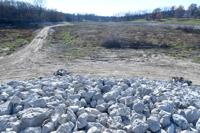Posted on December 1, 2020
Despite some early weather-related delays, work has continued on the restoration project at West Lake Park in Davenport.
The four lakes at the Scott County-owned complex have been drained, and many passersby on the nearby Interstate 280 have been getting the incorrect impression that work has stalled, said Roger Kean, executive director of the Scott County Conservation Office.
“The biggest thing going on right now is the watershed ponds, which you don’t see from the interstate,” Kean said in early November. “Hopefully, we’ll get that completed in the next month.”
As the watershed work wraps up, the focus will turn to dredging of two highly silted ponds on the 620-acre property. Shoreline stabilization and improved fish habitats also are on the agenda.
Dredging of the sediment at Blue Grass and Railroad lakes will begin as the schedule was designed — when the ground is good and firm and heavy equipment can access the lake beds without getting stuck in mud.
When the park was built in the 1960s, he said, sediment control was largely non-existent. The effects of insufficient controls are particularly evident at Blue Grass Lake, which is the western-most lagoon. The whole thing will have to be dredged.
The lake most familiar because of its proximity to the interstate and its popular beach is Lake of the Hills. It also is dry and awaiting improvements, including both manmade and nature-made fishing habitats.
Park workers cut down more than 200 diseased ash trees, Kean said, then secured them to lake beds with cables to create permanent habitats for the fish that will be stocked next year. A reef-like habitat will be created with dozens of buckets that contain tubes set in concrete, which were supplied largely by volunteers.
In addition to those volunteering to help with the restoration, other Quad-Citians have shown an interest in the project.
“People say it’s been their lifesaver during COVID, watching the project,” Kean said. “We’ve gotten caught up a lot. It will help to have a nice fall and winter.”
The joint project between Scott County Conservation and the Iowa DNR will remove about 150,000 cubic yards of sediment from the lakes. A 20-acre spoil site on the western side of the park will be the dumping ground for the material, which ultimately will be fashioned into a large hill.
A contract for the work has a March 2021 deadline.









Source: qctimes






